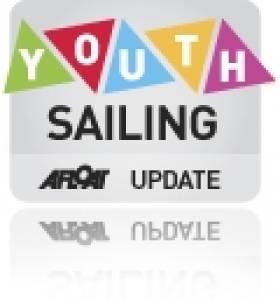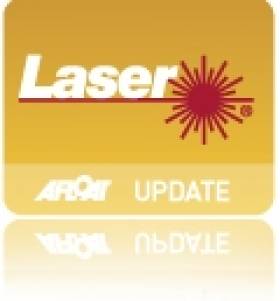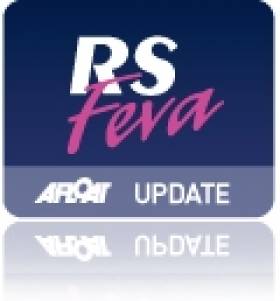Displaying items by tag: Laura Gilmore
Laura Gilmore Scoops Ladies and Laser Radial Titles At 2014 RYANI Youths
#YouthSaling - Congratulations are in order for Laura Gilmore, Northern Ireland's new ladies and Laser Radial champion after this weekend's RYANI Youths at Ballyholme Yacht Club.
The 17-year-old youth sailor fended off strong competition from fellow youths Sarah Eames (Ballyholme) and Gary Fekkes (East Antrim) to claim the Laser Radial crown with a net total of six points, five ahead of her closest rival.
The Strangford Lough Yacht Club member and junior champ's victorious weekend got off to a slow start on Saturday, with lighter than forecast wind early on making things tough for the record 146 entries.
But soon a good, though shifty, 10-12 knot breeze filled in, enabling all fleets to get three races in across both race areas.
On Sunday, conditions were light and shifty, making conditions difficult for race officers. Still, two races went ahead with stiff competition from a number of clubs.
RYANI performance manager Richard Honeyford thanked Ballyholme YC "for hosting such a great regatta. It was fantastic to see the numbers going from strength to strength, with a large number of clubs being represented.
"Well done to all competitors and prize winners. It is great for RYANI to be able to recognise the dedication of our sailors and clubs.”
Ballyholme Prepares for Belfast Lough Laser Nationals
#laser – Next week will see one of the most competitive sailing events seen in Northern Ireland for several years as the Olympic Laser class hosts its Irish Championships on Belfast lough.
This summer has seen the best Laser Radial sailors from Ireland including many well know faces from Bangor compete across Europe. Séafra Guilfoyle from Cork won the Silver medal at the ISAF Youth World Championships in Portugal where Sarah Eames also competed. Seafra and 6 members from Ballyholme YC also competed at the World Youth Championships in Poland where Seafra came 7th. BYC's Ryan Glynn has just returned from the UK Laser Radial Nationals at Largs, Scotland with 4th place. Brother (and last year's Topper World Champion) Liam Glynn was 5th (2nd Youth), Tim Brow was 7th while Laura Gilmore from SLYC was 1st Youth Lady in a fleet of 86 boats.
Ballyholme Yacht Club will host the Zhik Irish Laser National Championships from 28 - 31st August 2014 - all of the RYANI and ISA youth squads should be in attendance for the Radial championship and a number of the GB squad will also be competing. BYC has one of the largest Laser fleets in Ireland with over 50 regularly competing in club racing and their Icebreaker series over the winter. The 2013 Irish Laser Nationals had over 120 entries. Event Organiser Paddy Brow and Race Officer Robin Gray will ensure a great series of racing and socialising off the water.
The Laser is the most popular single handed dinghy in the world and an Olympic dinghy. There are 3 fleets - Standard, Radial and 4.7 - which use the same boat but have different sail sizes for different size and weight of crew. The Standard is a men's Olympic dinghy - James Espey from Ballyholme YC represented Ireland at London 2012 - and the Radial is the female Olympic dinghy - Annalise Murphy from National YC came 4th at the London Olympics. The 4.7 is a major youth pathway dinghy worldwide.
Today (Wednesday 20th) is the last day for Early Entry Discount and Online Registration.
#feva – Ireland's Laura Gilmore and Molly Fekkes from Strangfrod Lough jumped 20 places to 33rd at the 171–boat RS Feva World Championship playing out in the waters off the Compagnia della vela Grosseto until Friday, July 26th.
A very steady 260° wind that started off at 12 knots got up to 16 in the course of the afternoon.
This meant the race committee had no problem starting all three scheduled races with the first off at around 12:30, bringing the qualifying phase of the event to a successful conclusion.
After yesterday being dominated by the British, today was very much the domain of Italian girls Margherita Porro and Francesca Andrea Dall'Ora. The two young Associazione Nautica Sebina sailors ended qualifying at the top of the overall standings on just 8 points thanks to two seconds and a one win. A fantastic result along with a momentous first position in the All Girls standings. On the same points as the Italians but less well-placed than them in the final race were this morning's leaders Brits Elliot Wells and Jake Todd (2,1,2), who finished second in the overall standings ahead of their fellow countrymen Hannah Bristow and Bobby Hewitt (1,1,8), who took the third step on the podium on just 12 points.
From tomorrow, the 171 boats will be divided into three fleets of 57 crews (Gold, Silver and Bronze). Each team will be allotted points equivalent to their final position in qualifying (e.g. 1st position will have 1 point, 2nd 2 points, etc.) which cannot be discarded in the final phases. The first races are scheduled for tomorrow, Wednesday, July 24th, from 11:55.
Provisional standings* top 5 RS Feva World Championship – After six races
1. ITA 2592 - Margherita Porro/Francesca Andrea Dall'Ora - Associazione Nautica Sebina - 2, 1, (4), 2, 2, 1 - Tot. 8 points
2. GBR 4332 - Elliot Wells/Jake Todd - Hayling Island Sailing Club - 1, (2), 2, 2, 1, 2 - 8 pt
3. GBR 4610 - Hannah Bristow/Bobby Hewitt - Leigh and Lowton - 2, 2, 6, 1, 1, (8) - 12 pt
4. GBR 3424 - Courtney Bilbrough/Orla Mitchell - Docklands S&W Centre - 4, 1, (12), 7, 3, 3 - 18 pt
5. GBR 4883 - Jamie Smith/Piers Nichols - Hayling Island Sailing Club - 5, 5, 6, 3, (9), 2 - 21 pt
































































